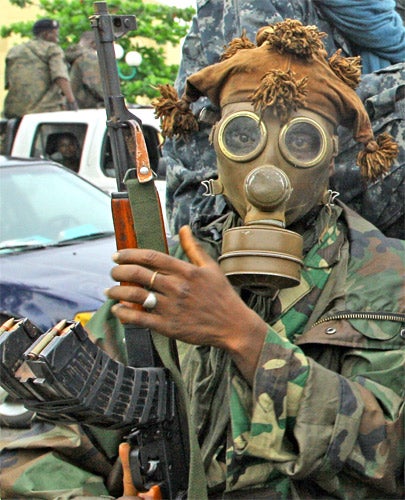Holed up in a bunker, Gbagbo on the brink of surrendering power
France and UN prepare ground for Ivory Coast strongman to step down after air strikes prove decisive in battle with opposition

After a lost election, four months of international pressure, air strikes by the United Nations and a resumption of civil war, Laurent Gbagbo was last night negotiating his departure from power in Ivory Coast.
While the strongman hid in his bunker, outside on the streets of Abidjan, bodies lay uncollected, gangs of armed men roamed the lagoon and doctors said it was still too dangerous to answer the constant appeals for help.
The crisis has sent 130,000 refugees across the border into Liberia, displaced up to a million people and set a toll which is expected to rise sharply from the 1,300 deaths so far known.
But Gbagbo struck a defiant tone in a telephone interview with France's LCI television channel last night, saying he had won November's election and denying that any political decision had been made about his future.
"The army has called for the suspension of hostilities... and it is discussing the conditions of a ceasefire with the other forces on the ground, but on a political level no decision has yet been taken," Gbagbo said, speaking from the presidential palace in Abidjan. He criticised France for intervening in what he said was an internal dispute, adding: "I'm not a kamikaze. I love life. My voice is not the voice of a martyr, no, no, no, I'm not looking for death. It's not my aim, to die."
The denouement which began late on Monday cast former colonial power France in a leading role. It was France's 1,600-strong "unicorn force" that joined UN helicopter attacks to remove the Gbagbo forces' heavy weapons and clear the way for the ground troops loyal to Ouattara, to win their final offensive. French lawyers representing Mr Gbagbo were believed to be arguing the terms of a potentially controversial retirement package for the 65-year-old and his wife, Simone Gbagbo, who is thought to be seeing out the conflict at a coastal resort in Ghana. "If everything goes well, we will have a declaration soon," a Gbagbo aide, Ahoua Don Mello, said. France's Foreign Minister Alain Juppé was confident enough last night to tell parliament in Paris that "we are on the brink of convincing him to leave power".
However, the government of Nicolas Sarkozy – who is keen to avoid accusations of using foreign adventures to bolster flagging home support – continued to insist it had used its military power only at the behest of the UN Secretary General, Ban Ki-moon. "One might think that we are getting to the end of the crisis," said a UN spokesman, Hamadoun Toure, who claimed Mr Gbagbo's aides were defecting. "He is alone now, in his bunker with a handful of supporters and family members."
The night's onslaught, which saw UN peacekeepers stretch their mandate to destroy heavy weapons they claimed were being used to target civilians, had slowed to sporadic fighting by yesterday afternoon. The toll from the fighting remains unclear with hospitals cut off from each other, running low on essential drugs and, like much of the city, without adequate food and water.
"From the information we have there have been a lot of civilian casualties," said Xavier Simon, from Médecins Sans Frontières in Abidjan. "There are bodies in the streets; the wounded are sheltering at home." Doctors said stray bullets and shelling had hit residential areas but it was unsafe for ambulances to collect the injured. "We have been getting a lot of calls from people who have been wounded but we can't help them," said Mr Simon. "We're ready, but we need access to the population."
The world's leading cocoa producer has been in crisis since the presidential elections saw opposition leader Mr Ouattara beat Mr Gbagbo, who then overruled his own election commission and got hand-picked judges to declare him the winner. A tense stand-off followed as the African Union tried to mediate a peaceful solution but that ended 10 days ago when troops from the northern Force Nouvelles (FN) swept south in a lightning offensive. After years of distancing himself and his RDR party from the FN, Mr Ouattara acknowledged them as his forces and claimed the attacks were necessary to ensure the outcome of the election.
Skirmishes were still occurring last night in Abidjan and foreign nationals were being evacuated by French forces who control the airport. Staff from Save the Children in the city told of their ordeal as battle raged through the night. "We heard loud detonations, there was one that was really loud and we felt the windows shake," said one aid worker. The crisis has wrecked Ivory Coast's already declining economy and driven up global cocoa prices as traders have largely abided by an international embargo designed to put pressure on Mr Gbagbo.
Join our commenting forum
Join thought-provoking conversations, follow other Independent readers and see their replies
Comments